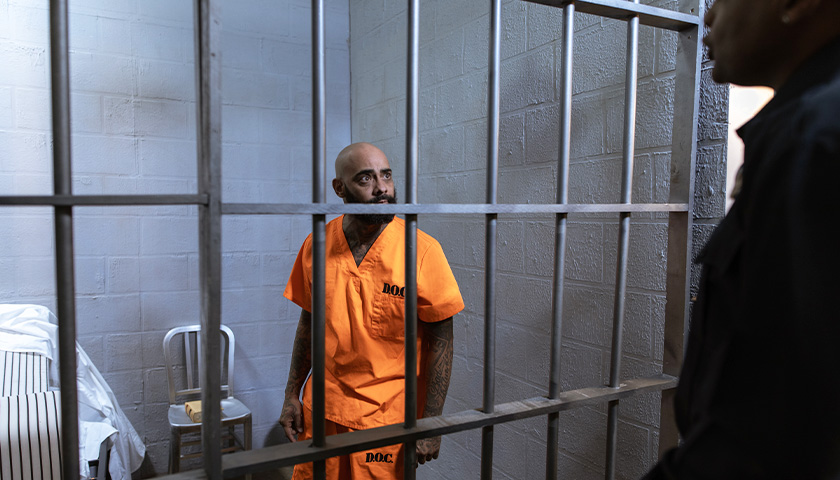by Robert Stacy McCain
Bari Weiss was not the first victim of “cancel culture,” and certainly she will not be the last, but her exit from the opinion pages of the New York Times has finally focused national attention on the steadily increasing toll of intellectual intolerance among the soi-disant progressive elite. Ms. Weiss’s public resignation letter, which described “constant bullying by colleagues who disagree with my views,” with her superiors at the newspaper evidently condoning this harassment, exposed a cult-like climate of ideological conformity at the Times. Because she is rather young — she was born in 1984, the year Ronald Reagan was reelected — Ms. Weiss is not old enough to remember when liberals posed as champions of free speech and open debate. Some of us are old enough to remember, however, and have a duty to teach young people how it was that liberalism slowly succumbed to totalitarianism.
A good place to start would be the Supreme Court’s Roe v. Wade decision of 1973, a judicial landmark of flagrant dishonesty. The court’s 7-2 majority, in an opinion written by Justice Harry Blackmun, claimed to locate a “right” to abortion in the Due Process Clause of the 14th Amendment. Of course, that amendment says nothing at all about abortion or pregnancy, and the two dissenting justices were caustic in denouncing the court majority’s fictitious claim.
“I find nothing in the language or history of the Constitution to support the Court’s judgment,” Justice Byron White wrote in his dissent. “The Court simply fashions and announces a new constitutional right for pregnant women and, with scarcely any reason or authority for its action, invests that right with sufficient substance to override most existing state abortion statutes.” Justice William Rehnquist expressed astonishment at how the majority had managed “to find within the scope of the Fourteenth Amendment a right that was apparently completely unknown to the drafters of the Amendment”:
As early as 1821, the first state law dealing directly with abortion was enacted by the Connecticut Legislature. By the time of the adoption of the Fourteenth Amendment in 1868, there were at least 36 laws enacted by state or territorial legislatures limiting abortion. While many States have amended or updated their laws, 21 of the laws on the books in 1868 remain in effect today. Indeed, the Texas statute struck down today was, as the majority notes, first enacted in 1857 and “has remained substantially unchanged to the present time.” There apparently was no question concerning the validity of this provision or of any of the other state statutes when the Fourteenth Amendment was adopted.
The only conclusion possible from this history is that the drafters did not intend to have the Fourteenth Amendment withdraw from the States the power to legislate with respect to this matter.
To put it bluntly, the entire legal basis of Roe v. Wade was a lie. The court had not merely usurped the authority of Congress to make federal law, or to amend the Constitution, to achieve the goal of legalizing abortion; in fact, the court had obliterated the authority of state legislatures to regulate medical practice, an area wherein the federal government had never hitherto claimed any role. No honest person could believe that this was what had been intended by those who drafted the 14th Amendment, or by the state legislatures that ratified that amendment. And yet, despite the self-evident bogusness of the Supreme Court’s majority opinion, Roe became the law of the land.
While it may not seem to Bari Weiss that this has anything to do with what happened to her at the New York Times, in fact Roe v. Wade was arguably the tipping point — a fulcrum of history — that has led to a world in which our basic First Amendment liberties are imperiled. Once our political elite discovered they could use the power of government to force people to accept a lie (which is what Roe was ultimately about), they began using that power more frequently and more confidently, prohibiting debate and punishing dissenters. Ms. Weiss ought to consider, in that regard, what happened at the 1992 Democratic National Convention.
In the 1980s and ’90s, Pennsylvania Gov. Robert Casey was credited with rebuilding his state’s Democratic Party “from the ashes,” in the words of Clinton strategist Paul Begala. Yet because he was a devout Catholic and a staunch opponent of abortion, Casey was silenced at the party’s 1992 national convention:
I was denied the opportunity to address the delegates in New York because I oppose abortion. To add insult to injury, a pro-abortion Republican woman from my home state was showcased as a featured speaker. She appeared on the platform with Kate Michelman of NARAL and Democratic Party Chairman Ron Brown as I watched from the upper reaches of Madison Square Garden. When the national party denied me the right to be heard, it was really denying Pennsylvania the right to be heard.
The pro-abortion faction in control of the party went out of its way to humiliate Casey, and, according to his friend Nat Hentoff, when the governor returned home from the convention, he wondered aloud, “What has become of the Democratic Party I once knew?”
Bari Weiss was only 7 years old when that happened, and it may not be obvious to her how that event heralded the approach of today’s “cancel culture.” Yet step by step the totalitarian march has proceeded. Little by little, year after year, on issue after issue, the silencing of dissent has become acceptable within “progressive” circles and, so long as they believed this method would help Democrats win elections, few liberals have objected.
It may surprise Ms. Weiss to learn that scarcely two decades ago, it was still permissible — even in the pages of the New York Times — to express skepticism toward computer-modeled predictions of global disaster caused by “climate change.” At some point during the presidency of George W. Bush, however, liberals proclaimed that “the science is settled,” and began treating skeptics as heretics. They coined the term “climate denier” to imply that skeptics were like Holocaust deniers. Liberals declare there is a scientific consensus on the subject and that anyone who does not go along is self-evidently “anti-science.”
So while politicians like Joe Biden are declaring war on the oil industry, the coal industry, and the internal combustion engine, no one is permitted to question the necessity of these draconian measures. No viewer of CNN or MSNBC, and no reader of the New York Times or the Washington Post, will ever encounter a word of dissent from the climate-change “consensus.” No one in the mainstream media is allowed to point out, for example, that Michael Mann’s famous “hockey stick” graph is a fraud. As with the fabricated “right” to abortion, the Big Lie of climate change cannot succeed without employing coercion to silence dissent.
A rigid conformity of opinion has been imposed on university campuses, creating an echo-chamber effect within which young people become accustomed to hearing nothing but what the militant Left wants them to hear. And as the alumni of elite universities have taken positions of influence in the media and other fields, they have sought to replicate that echo-chamber climate in the workplace. Disagreement is labeled “hate speech,” and woe be unto anyone who makes reference to facts that don’t fit the approved progressive narrative. If the management of the New York Times condones the Left’s bullying of Bari Weiss, a bisexual woman who calls herself a “centrist,” what hope is there for a heterosexual male conservative?
Perhaps Ms. Weiss should have a long talk with Cornell University Law Professor William Jacobson. Last month, 21 of his faculty colleagues signed a letter denouncing unnamed “commentators … leading a smear campaign against Black Lives Matter.” Professor Jacobson knew he was the target of this letter, which he said was part of an effort led by Cornell’s Black Law Students Association to get him fired. Their campaign against the professor focused on two articles he’d recently posted at his popular Legal Insurrection site (“The Bloodletting and Wilding Is Part of An Agenda To Tear Down The Country,” June 3, and “Reminder: ‘Hands up, don’t shoot’ is a fabricated narrative from the Michael Brown case,” June 4). After the news media took interest in the story, Cornell Law School’s dean issued a statement that called Professor Jacobson’s work “offensive and poorly reasoned” and said his articles “do not reflect the values of Cornell Law School.”
What was “offensive,” you see, was that Professor Jacobson had insisted on reminding readers of facts that do not support the Black Lives Matter (BLM) movement’s narrative. And he bluntly described where the movement is leading America:
You send your kids to public schools and college, where they are taught from their earliest years that America and capitalism are the sources of evil in the world, that we are a systemically racist society that consumes ‘black and brown bodies,’ while socialist and communist systems are more equal and fair. It’s all a lie, but it’s a lie told by the teachers, professors, and administrators with power.…
There is a concerted effort funded by leftist billionaires and high tech companies to control what you can say, and to silence you through mob action or social media throttling if you get out of line.…
The goal is to destroy capitalism, and to seek revenge. The Black Lives Matter movement, founded based on fraudulent narratives of the Trayvon Martin and Michael Brown cases, is led by anti-American, anti-capitalist activists. They have concocted a false narrative of mass murder of Blacks at the hands of police, when the statistics show otherwise.
Anyone with two eyes and a brain knows this is true, but you’re not allowed to say it, because in the identity-politics formula of the Left, the truth is “racist.” We are supposed to ignore the “offensive” fact that the movement’s co-founder has boasted that she and other BLM leaders are “trained Marxists,” just as we are expected not to notice BLM’s vow to “disrupt the Western-prescribed nuclear family structure requirement.” Any criticism of this movement is impermissible, and even quoting the movement’s leadership is prohibited, if such quotes might tend to inspire opposition. Telling the truth about BLM is a “smear campaign.”
If telling the truth is considered a firing offense by so many of Professor Jacobson’s university peers, should Bari Weiss be surprised by her discovery “that intellectual curiosity … is now a liability” at the New York Times? In her resignation letter, Ms. Weiss points out the irony that she was hired for the express purpose of “bringing in voices that would not otherwise appear” in the Times, to compensate for the “critical shortcoming” that made Donald Trump’s election such an unexpected event for those inside the liberal echo chamber: “The paper’s failure to anticipate the outcome of the 2016 election meant that it didn’t have a firm grasp of the country it covers.”
Alas, the problems at the New York Times did not begin in 2016, and the paper has long been complicit in the Left’s project of defending lies by suppressing truth. When was the last time Ms. Weiss’s paper published anything remotely honest about the abortion industry and the holocaust — not too strong a word — that industry has inflicted on America since the Roe v. Wade decision? Nothing in the Constitution could justify the Supreme Court’s fabrication of a “right” to abortion, and yet that murderous doctrine has become sacrosanct among liberals. We ought to heed the words of Theodore Dalrymple:
Political correctness is communist propaganda writ small. In my study of communist societies, I came to the conclusion that the purpose of communist propaganda was not to persuade or convince, not to inform, but to humiliate; and therefore, the less it corresponded to reality the better. When people are forced to remain silent when they are being told the most obvious lies, or even worse when they are forced to repeat the lies themselves, they lose once and for all their sense of probity. To assent to obvious lies is in some small way to become evil oneself. One’s standing to resist anything is thus eroded, and even destroyed. A society of emasculated liars is easy to control. [Emphasis added.]
America has, as a society, assented to obvious lies. We have tolerated falsehood, and in the process have enslaved ourselves by empowering liars who, now that they control the levers of authority, are determined not to tolerate the truth. “Woe unto them that call evil good, and good evil,” declared the prophet Isaiah, and elsewhere in the Bible we are told God hates “a lying tongue, and hands that shed innocent blood.”
Has it occurred to Bari Weiss, or her former colleagues at the New York Times, that perhaps they have incurred the wrath of God? Probably not. Nobody who believes the Bible would work for the New York Times, would they?
– – –
Robert Stacy McCain is the author of Sex Trouble: Essays on Radical Feminism and the War Against Human Nature. He blogs at TheOtherMcCain.com.
Photo “Bari Weiss” by Bari Weiss.






Thank you for this well written piece.
I personally think the cancel culture has always been there, it just hasn’t been so in your face as it is now. Roe v Wade may have started this but, in my eyes, this culture gained a tremendous amount of momentum with the Election 2000 recount. This is my first recollection where liberals went bat-s*** crazy, not accepting defeat and beat that drum for 8 years. Clinton staffers prying off the W’s on all the computer keyboards as they left the White House. The Democrat party have been nothing but a bunch of perpetual 2-year-olds since.